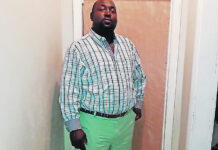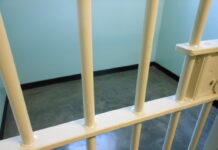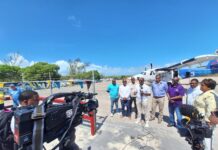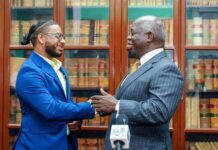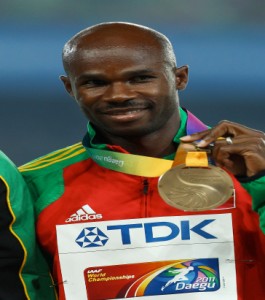
By Alphaeus Finlayson, BAAA
100m
This was probably one of the most anticipated events in the championships.
World record holder and defending champion Usain Bolt was seventh in the seasonal list at 9.88sec with countryman Asafa Powell in the lead at 9.78sec.
Tyson Gay, who had beaten Bolt last year had the season’s second best time at 9.79sec. Gay had been injured at the US Championships and days prior to the Opening Powell pulled out.
The 100m then should have been a cakewalk for Bolt. He was on the front of the Daily Programme.
In the first round heats Bahamian Adrian Griffith was the first to suffer from the new false start rule which had been in effect from January of 2010. He was out after one false start.
In the semi-final it was Dwain Chambers of Great Britain who had served four years banned from competition due to a Doping offence. He had run second to Bolt in the first round.
Justin Gatlin, the Athens Olympic champion and Helsinki champion was back after serving a four year suspension for Doping. He ran 10.31sec for second in the first round and 10.23sec for fourth in the second, not advancing to the final.
Jamaican Yohan Blake won the first semi-final in a seasonal best of 9.55sec, Usain Bolt the second in 10.05sec, and Kim Collins, the 2003 champion the third in 10.08sec.
The unimaginable happened in the final. Usain Bolt, who everybody said did not have to worry about his start, false started. It was clear and Bolt took off his jersey as he ran down the straight.
This caused numerous people to question the existence of the no-fault start rule.
The question now was who will win? Was it going to be Jamaica’s Nesta Carter, France’s Christophe Lemaitre or Jamaica’s Blake, who had the ninth and tenth times this season?
Blake was the clear winner at 9.92sec, a seasonal best with The USA’s Walter Dix in second in 10.08sec.
The old reliable Kim Collins, the 2003 champion and 2007 bronze medalist, at thirty-five years of age, finished with the Bronze medal in 10.09sec.
At twenty-one Frenchman Christophe finished in fourth place with a 10.19sec clocking, Daniel Bailey from Antigua and Barbuda finished fifth in 10.26sec, France’s Jimmy Vicaut at age nineteen finished in fifth place in 10.26sec, and Jamaica’s Nesta Carter a surprising seventh in 10.95sec.
Blake became the second Jamaican to win the 100m at the World Championships.
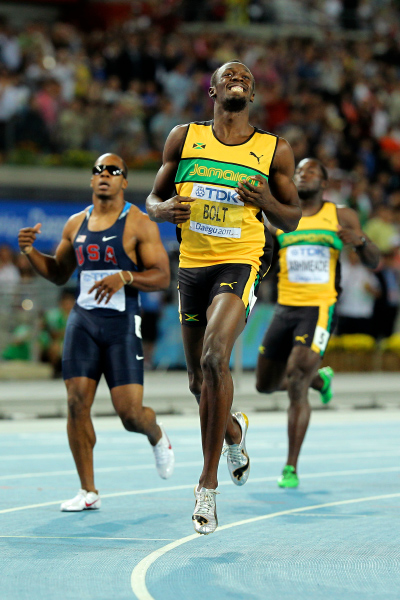
200m
After the fault start by Bolt in the 100m everybody was waiting to see how he would do in the 200m, his favourite event.
The first round and semi-final were held on Thursday, the second of September.
Bolt lead the first round qualifiers with 20.30sec. The USA’s Walter Dix had the second best first round time at 20.42sec with Bahamian Michael Mathieu running the third best first round time, running in Bolt’s heat, at 20.46sec.
France’s Christopher Lemaitre had the best time in the semi-final, running 20.17sec, a seasonal best. Bolt ran 20.31sec and Dix 20.37sec.
In the final Panamanian Alonso Edward, Silver medalist from Berlin, did not finish.
Bolt won with an impressive 19.40sec, the best time in the world this season, and the third best time ever, behind only Bolt’s World record of 19.19sec and Michael Johnson’s World record of 19.32sec.
There was no slowing down or clowning at the tape.
Dix finished in second place with a 19.70sec seasonal best and France’s Lemaitre finished with the Bronze medal in a French National record of 19.80sec.
400m
There was no clear favourite in this event. Grenadian Kirani James, nineteen at the time, ran 44.61sec in London in August to set the World’s leading time. In that race the defending champion LaShawn Merritt finished second after not running for nearly two years. His time then was 44.74sec.
There were five first round heats and Merritt ran 44.35sec in his first round heat, the fastest time ran in history for a first round in either the Olympics or World Championships.
Rondell Bartholomew of Grenada ran 44.82sec in his first round heat. Trinidad and Tobago’s Reny Quo, the Berlin Bronze medalist ran 44.84sec in that heat.
Jamaica’s Jermaine Gonzales won the second heat in 45.12sec. Demetrius Pinder from The Bahamas finished fourth in 45.53sec, advancing to the semi-final. James won the fourth heat in 45.12sec. In that heat The Bahamas’ Ramon Miller ran a seasonal best of 45.31sec to advance to the semi-final.
The Bahamas’ Chris Brown the fifth heat in 45.29sec. In that heat was South African, “The Blade Runner” Oscar Pistorius in 45.39sec. Pistorius had won a decision by the IAAF to allow him to participate with a prostethis.
In the semi-final Merritt continued his speedy running, running 44.76sec for the first semi-final heat. James ran 45.20sec to win the second heat and Jamaica’s Gonzales ran 44.99sec to win the third heat of the semi-final.
In the final were Merritt from The USA ,James and Bartholomew from Grenada, Gonzales from Jamaica, the Borle’e twins Kevin and Jonathan from Belgium, Tabarie Henry from the US Virgin Islands, and Femi Ogunode from Qatar.
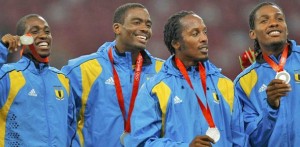
This was a race to watch as the teenager from Grenada, who had won the IAAF World Youth, and junior Championships, ran down the defending champion Merritt to win in 44.60sec, an improvement of a hundredth of a second on his Personal best. After running the fast time in the preliminary rounds it seems that Merritt was unable to respond to the finishing surge of James’.
Merritt was three hundredths of a second behind in 44.63sec and Belgium’s Kevin Borle’e finished in third in 44.90sec.
Gonzales was fourth in 44.99sec, the identical time he ran in the semi-final. Jonathan Borle’e placed fifth in 45.07sec with Grenada’s Bartholomew sixth in 45.45sec, US Virgin Island’s Henry seventh in 45.55sec and Ogunode of Qatar eighth also in 45.55sec.
Henry had placed fourth in Berlin in 45.42sec.
Bahamian Chris Brown just missed the final with a 45.54sec clocking, just behind Henry who ran 45.53sec to make the final.
This was the first time since Paris in 2003 that Brown failed to make the final.
Demetrius Pinder finished seventh in his semi-final heat in 45.87sec and Ramon Miller fifth in his semi-final heat in 45.88sec.
Also from the region William Collazo from Cuba and Erison Hurtault from Dominica finished seventh and eighth in the first semi-final heat in 46.13sec and 46.41sec respectively.
In the second semi-final heat Costa Rica’s Nery Brenes finished fifth in 45.93sec and Jamaica’s Riker Hylton finished eighth in 46.99sec.
800m
At the age of twenty-two Kenya’s David Rudisha set a new World record of 1:41.01 nearly a year prior on August 29th in Rieti, Italy.
This season he had the best time of 1:42.61.
He also had the best semi-final time of 1:44.20sec, in winning the third semi-final heat.
Ethiopian Mohammed Aman had the second fastest semi-final time of 1:44.57, a National record. Marcin Lewandowski from Poland ran 1:44.60, a seasonal best. Sudan’s Abubaker Kaki, one of Rudisha’s main rivals ran 1:44.62 for third place in the first semi-final.
In the final Rudisha captured the Gold medal in 1:43.91 over Kaki’s 1:44.41. The usual fast finishing Russian Yuriy Borzakovskiy, Athens Olympic champion was able to secure third place in 1:44.49.
Poland’s Marcin Lewandowskiy finished in fourth plave in 1:44.80.
The USA’s Nick Symmonds finished in fifth place in 1:45.12.
Poland’s Adam Kszczot finished in sixth place in 1:45.25.
Kenya’s Alfred Kirwa Yego, the Berlin Silver medalist finished in seventh place in 1:45.83 and Ethiopia’s Mohammed Aman placed eighth in 1:45.93.
1500m
The action heated up in the semi-final where Kenyan Abel Kiprop won the second heat in 3:36.75 with Algerian Tarek Boukensa following him in 3:36.84, Morocco’s Mohamed Moustaoui in 3:36.87, Spain’s Manuel Olmedo fourth in 3:36.91 and Venezuela’s Eduar Villanueva fifth in 3:36.96, a National record.
The first semi-final was won by Matthew Centrowitz of the USA in ten seconds slower than the second heat in 3:46.66. Centrowitz is the son of former distance star Matt Centrowitz of the USA.
In that heat was Kenya’s Silas Kiplagat, the World leader at 3:30.47, who finished third in 3:46.75, France’s Mehdi Bala, the Silver medalist from 2003, who finished fourth in 3:46.87, and the Berlin champion Yusef Saad Kamel of Bahrain, who failed to reach the final with a 3:47.18 clocking.
The final saw the Beijing Olympic champion Kenya’s Kiprop win in 3:35.69 to Kiplagat’s 3:35.92.
The USA’s Matt Centrowitz won the Bronze medal with a 3:36.08. Centrowitz is the only USA athlete to win a medal in the 1500m in the championships other than the former Kenyan Bernard Lagat in Osaka and Berlin. Matt’s father Matthew was a two time Olympian.
Eduar Villaneuva of Venezuela, the only athlete from the Central American and Caribbean region in the competition to compete in the 1500, finished eighth in the final in 3:37.31.
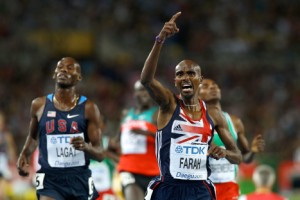
5000m
Britain’s Mohammed Farah had the World’s leading time this season at 12:53.11, just less than a half second under Eliud Kipchoge of Kenya’s championship record set in Paris in 2003.
Farah had been anticipated to win the 10000m but lost to Etiopia’s Ibrahim Jelan.
Also in the race were Bernard Lagat, who had won the event in Osaka and finished second in Berlin, and the championships record holder Kipchoge.
Farah was a little bit more experienced in the 5000m as he was able to defeat Lagat by twenty-eight seconds to win.
Ethiopia’s Dejen Gebremeskel finished in third another twenty-eight seconds behind Lagat in 13:23.92.
No other athletes from the Americas made the final.
10,000m
Ethiopian Kenenisa Bekele, World and championships Record holder, and four time winner of the 10000m at the age of twenty-nine was not at the top of his game in Daegu.
Mohamed Farah, born in Mogadishu and representing Great Britain had the World’s leading time at 26:46.57 at the Prefontaine Classic in Eugene Oregon in June. He had won this event in last year’s European Championships in Barcelona and seemed to be the person who would become World champion.
On the second day of the competition little known Ethiopian Ibrahim Jeilan defeated Farah with a run of 27:13.81.
Bekele dropped out of the race.
Ethiopian Imane Merga had the second best time in the world at 26:48.35. He finished in third place in 27.19.14.
Eritrea’s Zersenay Tadese, the Silver medalist from Berlin, finished in fourth place in 27:22.57.
Marathon
Kenya’s Abel Kirui set a new championships record of 2:06.54 in Berlin two years prior.
Kirui was able to win the Daegu event in 2:07.38, a seasonal best.
Kenya’s Vincent Kipruto finished in second place with a time of 2:10.06.
Ethiopia’s Feyisa Lilesa won the Bronze medal in a seasonal best of 2:10.32.
3000m Steeplechase
Ezekiel Kemboi of Kenya was the defending champion who set a new championships record of 8:00.43 in Berlin. His teammate Brimin Kiprop Kipruto had the World’s leading time at 7:56.34 done in Monaco in July.
Kemboi won the event in 8:14.85 with Kipruto second in 8:16.05.
France’ M. Mekhissi-Bernard ran 8:16.09 for the Bronze medal.
Ion Luchianov from Moldova finished in eighth place in 8:19.69, a seasonal best.
110m Hurdles
The USA’s David Oliver had the World leading time of 12.94sec, which he did in June at the Prefontaine Classic.
In the first round Jason Richardson, the 110m and 400m Hurdles champion in the 2003 World Youth Championships had the best time of 13.19sec.
Former World record holder Xiang Liu ran 13.20sec to win his heat.
David Oliver ran 13.27sec to capture his heat and Aries Merritt from The USA won his heat in 13.36sec. World record holder Dayron Robles settled for second in 13.42sec in that race.
The semi-final saw Xiang Liu capture the first heat in 13.31sec with Robles a
Richardson was far ahead in his semi-final heat in 13.11sec. David Oliver ran 13.40sec for second in that heat.
In the final Robles seemed to win but a protest was made by the Chinese federation which accused Robles of interfering with Xiang Liu with his right arm.
China won the protest and Robles was disqualified giving Richardson the Gold medal and Liu the Silver medal. Richardson clocked 13.16sec, Liu clocked 13.27sec.
Great Britain’s Andrew Turner won the Bronze medal with a 13.44sec performance.
Oliver finished in fourth place also in 13.44sec with Aries Merritt in fifth in 13.67sec.
Jamaica’s Dwight Thomas did not finish the event.
Other athletes from the Central American and Caribbean region participating fifth in the first heat of the first round in 13.57sec, behind Jamaica’s Richard The Cayman Islands who finished in third place in the second heat and advanced to the semi-final, Andrew Riley from Jamaica, who advanced to the semi-final by clocking 13.47sec, Hector Cotto from Puerto Rico, who clocked 13.60sec in that heat, and Paulo Villar from Colombia who also advanced to the semi-final from the fourth heat in 13.55sec.
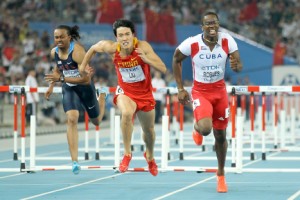
400m Hurdles
South Africa’s L.J. Van Zyl had been on a tear this season clocking the World leading time of 47.66sec on February 25th in Pretoria, and May 31st in Ostrava.
Three former champions, Felix Sanchez, Bershawn Jackson, Kerron Clement, and double Olympic champion Angelo Taylor were in the competition.
Great Britain’s David Green had the best time of 48.52sec in the first round
In the semi-final round Puerto Rico’s Javier Culson, the Silver medalist from Berlin had the best time winning the first heat in 48.52sec. Great Britain’s David Greene won the second heat in 48.62sec and Bershawn Jackson won the third heat in 48.80sec.
The 2007 and 2009 champion Kerron Clement finished eighth in Greene’s heat in 52.11sec and did not advance to the final.
Also not advancing to the final from the Central American and Caribbean region were Jehu Gordon from Trinidad & Tobago who will turn twenty in December and finished fourth in Berlin, Joseph Robertson, Leford Green and Isa Phillips from Jamaica, and Omar Cesneros from Cuba.
In the final on September first David Greene won in 48.26sec, Javier Culson finished second as he did in Berlin, this time in 48.44sec, and L.J. Van Zyl won the Bronze medal in 48.80sec.
Two time champion Felix Sanchez finished in fourth place in 48.87sec with 49.31sec.
Decathlon
The USA finished one and two in this event. The defending champion Trey Hardee captured the event with 8607 points, down from 8790 in Berlin.
Ashton Eaton was second in 8505 points just four points ahead of Cuba’s Leonel Suarez of Cuba, who finished second in Berlin.
Jamaica’s Maurice Smith the 2007 Osaka Silver medalist, was unable to continue after seven events.
Cuba’s Yordani Garcia stopped after six events.
20k Race Walk
Russia won both Gold and Silver medals in this event with Valeriy Borchin winning in 1:19.56 and Vladimir Kanaykin the Silver medal in 1:20.27.
Kanaykin holds the World record at 1:17.16 and Ecuador’s Jefferson Perez holds the Championship record at 1:17.21.
Colombia won the Bronze medal with Luis Fernando Lopez finishing in 1:20.38, a seasonal best.
Other athletes from the Central American and Caribbean region finishing in the top twenty were Guatemela’s Erick Barrando in 1:22.08, Mexico’s Eder Sanchez fifteenth in 1:23.05, Colombia’s James Rendon, nineteenth in a seasonal best of 1:24.08, and Mexico’s Moracio Nava, twentieth in 1:24.15.
50k Race Walk
Just like the 20k Russia won the Silver medal also by Denis Nizhegorodov in 3:42.45, a seasonal best.
Australia won the Bronze medal with Jared Talent, who also clocked a seasonal best with 3:43.36.
Ecuador’s Andre’s Chocho finished in eleventh place in a seasonal best of 3:49.32.
In the top twenty were these athletes from the Central American and Caribbean region, Edgar Hernandez of Mexico in eighteenth in a seasonal best of 3:54.46 and Jose’ Leyver of Mexico, nineteenth in 3:55.37.
4x100m Relay
This event was moved to the end of the competition.
There was a question a to whether Jamaica would have run former World record holder Asafa Powell who had pulled out of the men’s 100m due to injury.
Jamaica decided against that and with Nesta Carter, Michael Frater, World champion Yohan Blake and Dexter Lee finished second to Trinidad & Tobago in 38.07sec. The team of Keston Bledman, Marc Burns, Aaron Armstrong, and Richard Thompson won the second semi-final in 37.91sec.
St. Kitts & Nevis with Bronze medalist Kim Collins on the second leg finished in third with a National record of 38.47sec.
The USA with Trell Kimmons, Justin Gatlin, Maurice Mitchell, and Travis Padgett won the first first round heat in 37.79sec.
France finished second to them in 38.38sec.
Great Britain and Northern Ireland won the third heat in 38.29sec, with Poland in second in 38.37sec and Italy in 38.41sec.
Everybody was anticipating that Jamaica would win with Bolt in he line-up.
After all, they had the World record of 37.10sec set in Beijing in 2008 and the championships record of 37.31sec established in Berlin two years ago.
In the final Darvis Patton of The United States, running on the third leg, hit Brit runner Marlon Devonish, who rolled over into the lane of Trinidad & Tobago.
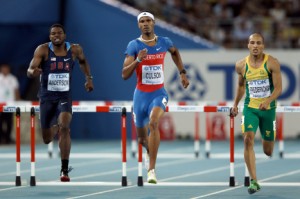
The United States and Great Britain and Northern Ireland were unable to finish.
It was now left to Jamaica and France.
Replacing young Dexter Lee with Bolt, Jamaica did what some may call the impossible. The set a new World record of 37.04sec to win, more than a second ahead of France’s 38.20sec.
Trinidad & Tobago were affected by Patton’s actions and finished in sixth place in 39.01sec.
This was a fitting end to and only World record in the Daegu World Championships.
For this record the Jamaican team received $100,000.
Prior to Jamaica’s 37.31sec in Berlin the World record in this event was 37.40sec by the USA in Barcelona in 1992 and Stuttgart in 1993.
The question now is, “will Jamaica break 37secs in London?”
4x400m Relay
There were two rounds of the Men’s 4x400m Relay. Two heats were run on September first.
The first three finishers in each heat and the two top losers would qualify for the final.
The United States won the first of the two heats with Greg Nixon, Jamaal Torrance, Michael Berry, and LaShawn Merritt in 2:58.02.
Jamaica finished in second place in 2:59.13.
South Africa finished third in 2:59.21.
Great Britain and Northern Ireland finished in fourth in 3:00.38 and Germany in fifth in 3:00.48.
The Bahamas competed in the second heat with Ramon Miller on starting leg, former World champion Avard Moncur on the second leg, Andrae Williams on the third leg, and LaToy Williams on the anchor leg.
They either had to finish in the top three or run better than Great Britain and Northern Ireland or Germany. If they did not make the top three they had to run better than 3:00.48, the time that Germany did.
That was not to be as Belgium won the heat in 3:00.78, Russia finished in second in 3:00.81, Kenya finished in third in 3:00.97 and The Bahamas finished in fourth in 3:01.54 below their seasonal best of 3:01.33 and their National record of 2:57.32.
The Bahamas was out of the final, having not run National record holder Chris Brown or National champion Demetrius Pinder in the first round.
In the final The USA team of Greg Nixon, Bershawn Jackson, Angelo Taylor, and LaShawn Merritt won in 2:59.31.
South Africa without Oscar Pistorius finished in second place in 2:59.87, and Jamaica with Allodin Fothergill, Jermaine Gonzales, Ryker Hylton, and Leford Green won the Bronze medal with a 3:00.10 clocking.
We hope you enjoyed this and the previous issues of Daegu World Championships Revisited.
We all look forward to the next edition, Moscow 2013.


